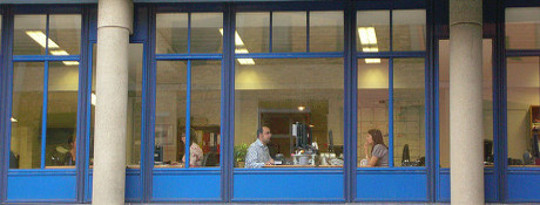
Office workers who are exposed to natural light sleep better and are more active compared to workers in windowless offices.
Employees with windows in the workplace received 173 percent more white light exposure during work hours and slept an average of 46 minutes more each night.
Workers without windows had lower scores than their counterparts on quality of life measures related to physical problems and vitality, as well as poorer outcomes on measures of overall sleep quality and sleep disturbances. The study was reported in the Journal of Clinical Sleep Medicine.
“There is increasing evidence that exposure to light, during the day—particularly in the morning—is beneficial to your health via its effects on mood, alertness, and metabolism,” says senior study author Phyllis Zee, a professor of neurology and sleep specialist at Northwestern University.
Get The Latest By Email
“Workers are a group at risk because they are typically indoors often without access to natural or even artificial bright light for the entire day. The study results confirm that light during the natural daylight hours has powerful effects on health.”
Workplace Design
“Architects need to be aware of the importance of natural light not only in terms of their potential energy savings but also in terms of affecting occupants’ health,” says co-lead author Mohamed Boubekri, an associate professor of architecture at the University of Illinois at Urbana-Champaign.
A simple design solution to augment daylight penetration in office buildings would be to make sure the workstations are within 20 to 25 feet of the peripheral walls containing the windows, notes Boubekri. “Daylight from side windows almost vanishes after 20 to 25 feet from the windows,” he says.
The study group included 49 day-shift office workers; 27 in windowless workplaces and 22 in workplaces with windows. Health-related quality of life and sleep quality were measured with a self-reported form and sleep quality was evaluated with the Pittsburgh Sleep Quality Index (PSQI). Light exposure, physical activity, and sleep were measured by actigraphy in a representative subset of 21 participants; 10 in windowless workplaces and 11 in workplaces with windows.
Actigraphy is a single device worn on the wrist that gives measures of light exposure as well as activity and sleep. The device records motion and light illuminance. The motion was used to determine activity levels during waking time and to calculate sleep time. The light luminance was used for measures of light exposure during the workday period.
“Light is the most important synchronizing agent for the brain and body,” says Ivy Cheung, co-lead author and PhD candidate in neuroscience in Zee’s lab at Northwestern. “Proper synchronization of your internal biological rhythms with the earth’s daily rotation has been shown to be essential for health.”
Also, people who get more light during the day may sleep better at night, which can also help improve health, Zee notes.
The National Institutes of Health supported the research.
Source: Northwestern University
Original Study







